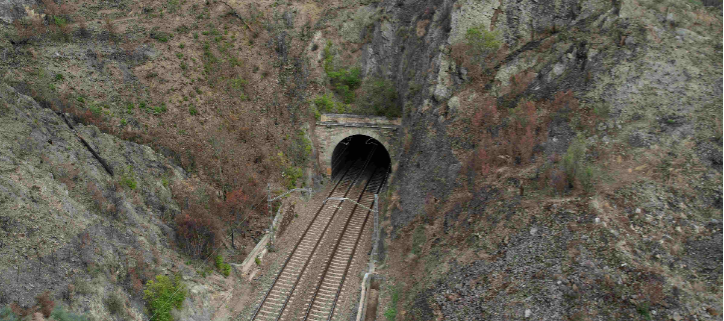Inse Rail, as part of a joint venture, has been awarded the contract to supervise the works to adapt the Madrid-Zaragoza stretch to the Rolling Highway (RH) of the Algeciras-Zaragoza route.
The RH is a cargo transport service that loads highway trailers or semi-trailers, using specialized cars. The initiative offers a competitive and collaborative logistics solution that significantly reduces both external costs and GHG emissions. Highway transport emits 4.7 times more GHGs than rail (annual savings: 620,000 tn CO2).
The work consists of adapting the railway loading gauge of tunnels and overpasses to the dimensions required for the semi-trailers that will use the RH service between Madrid and Zaragoza. This will require the modification of 40 overpasses and 26 tunnels on the conventional-gage line between the provinces of Madrid, Guadalajara, Soria and Zaragoza.
This will involve modification of the infrastructure, such as the expansion of the tunnel cross-sections and lowering of the platform, as well as changes to the superstructure, including renovation of sleepers, rails and ballast, as well as drainage and electrification work.
The framework of the actions between Madrid and Zaragoza to develop the Rolling Highway also includes extending the siding tracks of the Épila, Morés, Paracuellos-Sabiñán, Arcos de Jalón, Sigüenza, Jadraque, and Humanes de Mohernando stations to a length of 750 m.
This will make it possible to park trains and allow trains of interoperable lengths to cross, increasing the capacity, efficiency and competitivity of the line to promote railway transport of freight.
The implementation of the Algeciras-Zaragoza RH service will be crucial to increase the share of railway transport on the central branch of the Mediterranean Corridor as well as on the Atlantic Corridor. It will also strengthen intermodality on the Iberian Peninsula with traffic between Europe and Morocco.
The Algeciras-Zaragoza route will carry 6 trains per day (three in each direction) with trucks to/from Morocco, in addition to 2 trains per day (one each way) from Huelva to Zaragoza, with trucks to/from the Canary Islands and the area around Huelva; and another 4 trains per day (two each way) Sevilla-Zaragoza, with truck to/from the Port of Sevilla and Andalusia.
This means that each day, approximately 12,000 train-km will be covered, and approximately 360 trucks will be carried on this route, avoiding 360,000 km of highway truck traffic per day.
The services of the Algeciras-Zaragoza RH will continue from Zaragoza to Tarragona, through Lleida. This stretch connects the Main production and consumption nodes of the Iberian Peninsula, Madrid and Barcelona, and forms part of the flow between the center and south, and northeast Spain and the rest of Europe.
These actions will help achieve Sustainable Development Goal (SDG) 8, which is aimed at promoting sustained, inclusive and sustainable economic growth; and SDG 9, whose aims include the development of reliable, sustainable, resilient and high quality infrastructure.
Source: Inse Rail



